- Home
- Melina Marchetta
Jellicoe Road Page 2
Jellicoe Road Read online
Page 2
“That’s all we want back from the Townies,” Ben mutters, not looking at anyone.
Richard glances at Ben in disgust.
“And of course the Club House is a priority.” Ben starts up again, and I can tell he’s enjoying himself.
Silence. Tons of it, and I realise that I have my one vote that will keep me in. For the time being, anyway.
“Who’s in charge of the Townies this year?” I ask.
I’m staring at Richard. He realises that I’m here to stay and despite the look in his eyes that says betrayal, backstabbing, petulance, hatred, revenge, and anything else he’s planning to major in, he lets me have my moment.
“We’ll find out sooner or later,” he says.
But I like this power. “Ben?” I say, still staring at Richard.
“Yes?”
“Who’s in charge of the Townies these days?”
“Chaz Santangelo.”
“Moderate or fundamentalist?”
“Temperamental, so we need to get on his good side.”
“Townies don’t have a good side,” Richard says.
I ignore him. “Is he going to be difficult?” I ask Ben.
“Always. But he’s not a thug,” Ben says, “unlike the leader of the Cadets.”
“Who?” Richard barks out.
I see Ben almost duck, as if a hand is going to come out and whack him on the back of his head.
“First thing’s first. This year we get the Townies on our side,” I say, ignoring everyone in the room but Ben.
The chorus of disapproval is like those formula songs that seem to hit number one all the time. You know the tune in a moment and it begins to bore you in two.
“We’ve never done that,” Richard snaps.
“And look where it’s got us. In the last few years, we’ve lost a substantial amount of territory. It’s been split up between the Cadets and Townies. We haven’t got much left to lose.”
“What about the Prayer Tree?” Ben asks again.
“The Prayer Tree is not a priority,” I say, standing up.
“Raffaela reckons the trade made three years ago was immoral,” he argues.
I try not to remember that Raffaela, Ben, and I spent most of year seven together hiding out with Hannah. I can’t even remember Ben’s story. Heaps of foster parents, I think. One who put a violin in his hands and changed his life.
“Do me a favour,” I say to him, a tad on the dramatic side. “Don’t ever bring morality into what we do here.”
Chapter 2
When it is over, when I’m the last person sitting on the canvas-covered dirt floor, when the candles have burnt out and the sun has come up, I make my way towards Hannah’s house by the river. Hannah’s house has been unfinished ever since I can remember. Deep down I think that’s always been a comfort to me, because people don’t leave unfinished houses.
Working on her house has been my punishment ever since I got to this place six years ago. It’s the punishment for having nowhere else to go in the holidays or breaking curfew or running away with a Cadet in year eight. Sometimes I am so bored that I just go and tell her that I’ve broken curfew and she’ll say, “Well, no Saturday privileges for you, Taylor,” and she’ll make me work all day on the house with her. Sometimes we don’t say a word and other times she talks my ear off about everything and nothing. When that happens, there’s a familiarity between us that tells me she’s not merely my House caretaker. In that role she works out rosters, notifies us of transfers between Houses or exam schedules or study groups or detentions. Sometimes she sits with the younger kids and helps with homework. Or she invites them to her house and makes them afternoon tea and tells them some bad news, like a grandparent being dead or a parent having cancer, or makes up some fantastic story about why someone’s mother or father couldn’t come that weekend.
Absent parents aren’t a rare thing around here, probably because a tenth of the students are state wards. The Jellicoe School is run by the state. It’s not about money or religion but it is selective, so most of us are clever. The rest are a combination of locals or children of alternative environmentalists who believe that educating their children out in the bush is going to instil a love of nature in them. On the contrary, most of the students run off to the city the moment year twelve is over and revel in the rat race, never looking back. Then there are those like Raffaela, who is a Townie and is out here boarding with the rest of us because her parents teach at Jellicoe High School in town and they thought it would be better for her not to have to deal with that. Richard’s parents are embassy staff who live overseas most of the time, but his grandparents live in the outer district of the area so it seemed like the best option for him.
I don’t know where I fit in. One day when I was eleven, my mother drove me out here and while I was in the toilets at the 7-Eleven on the Jellicoe Road, she drove off and left me there. It becomes one of those defining moments in your life, when your mother does that. It’s not as if I don’t forgive her, because I do. It’s like those horror films where the hero gets attacked by the zombie and he has to convince the heroine to shoot him, because in ten seconds’ time he won’t be who he was anymore. He’ll have the same face but no soul. I don’t know who my mother was before the drugs and all the rest, but once in a while during our splintered time together I saw flashes of a passion beyond anything I’ll ever experience. Most other times she was a zombie who would look at me and say things like, “I didn’t name you. You named yourself.” The way I used to see it was that when I was born she didn’t take time even to give me an identity. Of course there’s a story behind it all and she’s not that cut-and-dried evil, but my version keeps me focused. Hannah, of course, knows one of the other versions, but like everything, she keeps it a mystery.
Usually, especially these days, we seem to be angry with each other all the time, and today is no different.
“Transfers,” she says, handing me the sheet. I don’t bother even looking at it.
“My House is full. No more transfers,” I tell her.
“There are some fragile kids on that list.”
“Then why transfer them to me?”
“Because you’ll be here during the holidays.”
“What makes you think I don’t have anywhere to go these holidays?”
“I want you to take them under your wing, Taylor.”
“I don’t have wings, Hannah.”
She stares at me. Hannah’s stares are always loaded. A combination of disappointment, resignation, and exasperation. She never looks at anyone else like that, just me. Everyone else gets sultana scones and warm smiles and a plethora of questions, and I get a stare full of grief and anger and pain and something else that I can never work out. Over the years I’ve come to accept that Hannah driving by on the Jellicoe Road five minutes after my mother dumped me was no coincidence. She has never pretended it was, especially during that first year, when I lived with her, before I began high school. In year seven, when I moved into the dorms, I was surprised at how much I missed her. Not living in the unfinished house seemed like a step farther away from understanding anything about my past. Whenever I look for clues, my sleuthing always comes back to one person: Hannah.
I take the list from her, just to get her off my back.
“You’re not sleeping.” Not a question, just a statement. She reaches over and touches my face and I flinch, moving away.
“Go make yourself something to eat and then get to class. You might be able to make second period.”
“I’m thinking of leaving.”
“You leave when you finish school,” she says bluntly.
“No, I leave when I want to leave and you can’t stop me.”
“You stay until the end of next year.”
“You’re not my mother.”
I say that to her every time I want to hurt her and every time I expect her to retaliate.
“No, I’m not.” She sighs. “But for the time being, Taylor, I’m all
you have. So let’s just get to the part where I give you something to eat and you go to class.”
At times it’s like sadness has planted itself on her face, refusing to leave, an overwhelming sadness, and sometimes I see despair there, too. Once or twice I’ve seen something totally different. Like when the government sent troops overseas to fight, she was inconsolable. Or when she turned thirty-three. “Same age Christ was when he died,” I joked. But I remember the look on her face. “I’m the same age my father was when he died,” she told me. “I’m older than he will ever be. There’s something unnatural about that.”
Then there was that time in year eight when the Hermit whispered something in my ear and then shot himself and I ran away with that Cadet and the Brigadier brought us back. I remember the Brigadier’s hard face looked as if he was trying with all his might for it to stay hard. Hannah didn’t look at him and I remember it took a great effort for her not to look at him. She just said, “Thanks for bringing her home,” and she let me stay at her unfinished house by the river. She held on to me tight all night because somewhere in the town where the Brigadier found us, two kids had gone missing and Hannah said it could have easily been me and the Cadet. They found those two kids weeks later, shot in the back of the head, and Hannah cried every time it came on the news. I remember telling her that I thought the Brigadier was the serial killer and it was the first time I saw her laugh in ages.
Today there is something going on with her and I can’t quite figure it out. I glance around the room, noticing how tidy it looks. Even her manuscript seems shuffled neatly in a pile in one corner of the table. She’s been writing the same novel ever since I’ve known her. Usually she keeps it hidden, but I know where to find it, like those teenage boys in films who know where to find their father’s porn. I love reading about the kids in the eighties, even though I can’t make head or tail of the story. Hannah hasn’t structured it properly yet. I’ve got so used to reading it out of sequence but one day I’d like to put it in order without worrying that she’ll turn up and catch me with it.
She sees me looking at the pages. “Do you want to read it?” she asks quietly.
“I don’t have time.”
“You’ve wanted to read it for ages, so is it okay to ask why not, now that I’m offering?”
“That’s new,” I say to her.
“What’s new?”
“You asking me a question.”
She doesn’t respond.
“You never ask me anything,” I accuse.
“Well, what would you like me to ask you today, Taylor?”
I stare and as usual I hate her for not working out what I need from her.
“Do you want me to ask where you’ve been all night? Or do you want me to ask why you always have to be so difficult?”
“I’d prefer that you asked me something more important than that, Hannah!”
Like how am I supposed to lead a community? I want to say. Or what’s going to happen to me this time next year? Am I just going to disappear like our insignificant leaders did last night? And where do I disappear to?
“Ask me what the Hermit whispered in my ear that day.”
I can tell that she’s stunned, her hazel eyes wide with the impact of my request. She takes a moment or two, like she needs to catch her breath.
“Sit down,” she says quietly.
I shake my head and hold up the list she gave me. “Sorry, no time. I’ve got fragile kids to look after.”
When I get back, classes have just finished and everyone’s making their way back into their Houses. Jessa McKenzie is sitting on the verandah steps. Despite her being in year seven and in Hastings House, somewhere in my worst nightmare she’s become surgically attached to me and nothing, not anger, not insults, not the direst cruelty can dislodge her.
“Don’t follow me. I’m busy.” I keep walking. No eye contact because that will encourage her. That someone can want something out of another person who gives absolutely nothing in return astounds me. I want to say to this kid, “Get out of my life, you little retard.” Come to think of it, I have actually said that and back she comes the next day like some crazed masochistic yo-yo.
“They reckon the Cadets are arriving any minute and that this time they mean business.” Jessa McKenzie always speaks in a breathless voice, like she hasn’t stopped speaking long enough to take a breath her entire life.
“I think they meant business last year when they threw every bike in the school over the cliff.”
“I know you’re worried as well. I can tell you are,” she says softly.
My teeth are gritted now. I’m trying not to but they grit all the same.
I get to the front door, dying for an opportunity to shut it in her face, but Jessa McKenzie still follows, like those tenacious fox terriers that grab hold of the bottom of your pants and tug.
“The kids in my old dorm are scared, you know,” she explains. “The year sevens?” As if I’ve asked a question. “It’s because the older kids are going on about the Cadets coming and how bad it is. I think you should speak to them, Taylor. Now that you’re leader”—she leans forward and whispers—“of the Underground Community.”
My hand is on the door, almost there, almost…but then I stop because something lodges itself in my brain like a bullet.
“What do you mean ‘in my old dorm’?”
She’s beaming. Freckles glowing.
I look at the transfer paper in my hands and then back at her. I open it slowly, knowing exactly whose name I’m about to see there, transferred to Lachlan House. My House.
“You have no idea how much I can help,” she says. “Raffaela thinks I’ll be better off in the senior rooms than the dorms.”
“What would Raffaela know?”
“She reckons she can work out where the tunnel is,” I hear Raffaela say behind me.
“My father used to say…”
But I’m not listening to what Jessa McKenzie’s father used to say. I’m sandwiched between my two worst nightmares.
“Congratulations,” Raffaela says, “although I think Richard and the others are already organising a coup.” Raffaela always has this weight-of-the-world, old-woman thing happening.
“Congratulations from me, too.” Jessa McKenzie is still beaming.
“We’re going to work out where the tunnel is,” Raffaela says, “and get back the Prayer Tree and learn how to…”
I want to be sitting in front of my computer, where you can press a button to block out your junk mail. These two are my junk mail.
“But Taylor,” Jessa continues in that hushed annoying voice of hers. “You have to get to know the kids in your House because Chloe P. says they hardly know you down in the dorms.”
“Incoming!” This comes from one of our guys sitting in the surveillance tree.
Raffaela and I exchange looks before she begins bustling the younger lot into the House.
The Cadets have arrived.
I’m in charge.
The territory wars are about to recommence.
They met Jude Scanlon for the first time exactly one year after the accident. At that time Webb thought nothing would make sense ever again. The pain was worse now because up till then Narnie and Tate and Webb had all just felt numb and if it hadn’t been for Fitz’s spirit blasting them out of their grief, Webb honestly believed that the three of them would have made some crazy suicide pact. But during that year, when they were fourteen years old, the numbness went away, replaced by memories that made Narnie disappear inside herself and him ache. He saw the same in Tate. Despite her ability to enjoy most of their days, sometimes her despair was so great that, in a melancholy moment when she’d allow herself to think of her family, she’d almost stop breathing and he’d hold her and say, “I’m here, Tate. I’m here, Tate. I’m here.” Tate had lost her younger sister as well as her parents in the accident. “We were playing Rock, Paper, Scissors,” she told him once. “I was paper and she was rock so I lived and she died
.”
That year, a boys’ school from the city had decided to experiment and send all their students from year eight to eleven on a six-week life-education project as part of the Cadet program. They were to live by the river from mid-September to the week after the October holidays ended.
“We can play skirmish,” Fitz said, clutching his gun, his eyes blazing with the possibilities as the convoy of buses drove into town.
As his Cadet troop jogged along the Jellicoe Road, their boots thumping the ground, eliminating anything in their path, Jude Scanlon noticed the damaged poppies. There seemed to be five, bent out of shape, fragments on the bottom of the boot of the kid in front of him—damaged beyond repair. For reasons he couldn’t understand a sadness came over him and it was then he saw the girl standing on the other side of the dirt road, her eyes pools of absolute sorrow, her light brown hair glowing in the splinters of sunlight that forced their way through the trees. It was as if he had seen a ghost, some kind of apparition, which haunted him through that night. The next day he found himself returning to the very same spot, after hours, with five seeds in his pocket. Then, on his knees, he planted something for the first time in his life.
“They have to go deeper,” he heard a voice say. “Or else the roots won’t take.”
There were four of them. Two boys and two girls. He recognised one of the girls from the day before and something inside him stirred. He could tell the speaker was related to her, his hair was the same golden brown, his eyes, though, were full of life. The girl on the other side of the speaker was smiling gently and then there was a boy with a wicked grin and laughing eyes.
“Tate,” the smiling girl said, extending her hand. “And this is Webb and Fitzy and you kind of met Narnie yesterday.”
Narnie.
“I didn’t…we didn’t mean to…”
The boy, Webb, shook his head. “It always happens.”
“Maybe you should find another spot to plant your flowers.”
“There can be no other spot,” Webb said quietly.
Jude pulled the rest of the seeds from his pocket and they all took one each then side-by-side on the Jellicoe Road they planted the poppies.

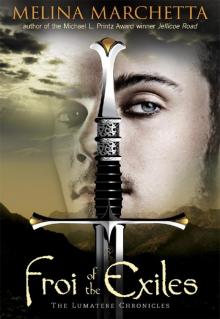 Froi of the Exiles
Froi of the Exiles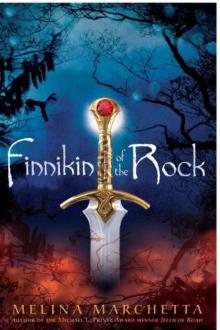 Finnikin of the Rock
Finnikin of the Rock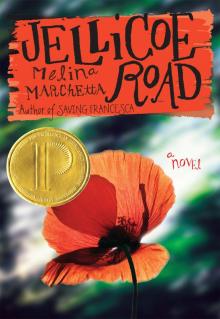 On the Jellicoe Road
On the Jellicoe Road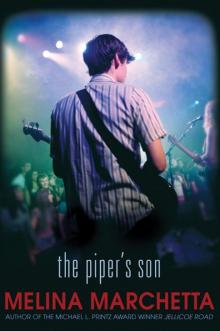 The Piper's Son
The Piper's Son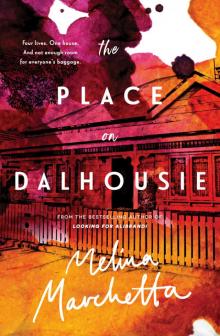 The Place on Dalhousie
The Place on Dalhousie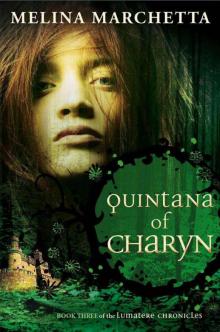 Quintana of Charyn
Quintana of Charyn The Lumatere Chronicles: The Complete Trilogy
The Lumatere Chronicles: The Complete Trilogy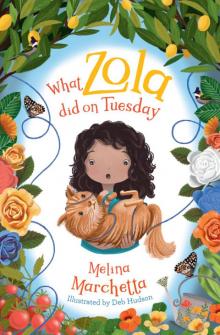 What Zola Did on Tuesday
What Zola Did on Tuesday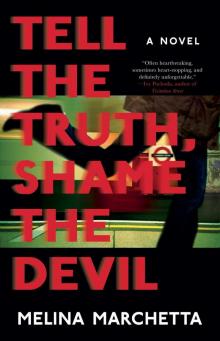 Tell the Truth, Shame the Devil
Tell the Truth, Shame the Devil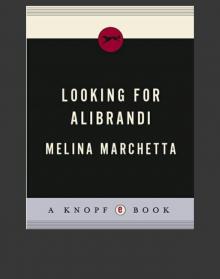 Looking for Alibrandi
Looking for Alibrandi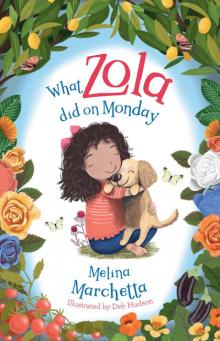 What Zola Did on Monday
What Zola Did on Monday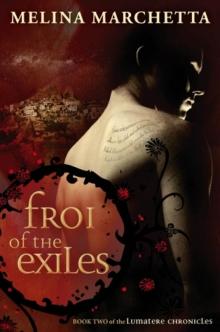 Froi of the Exiles lc-2
Froi of the Exiles lc-2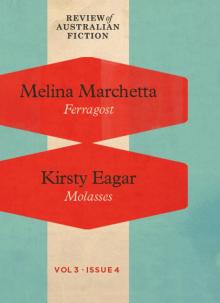 Review of Australian Fiction, Volume 3, Issue 4
Review of Australian Fiction, Volume 3, Issue 4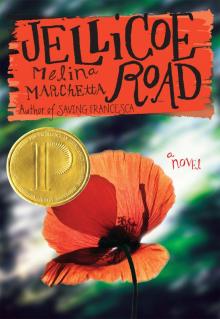 Jellicoe Road
Jellicoe Road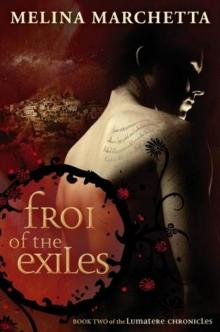 Froi of the Exiles: The Lumatere Chronicles
Froi of the Exiles: The Lumatere Chronicles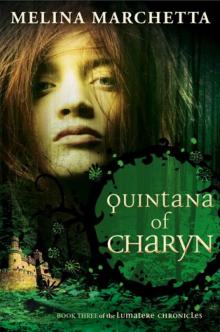 Quintana of Charyn lc-3
Quintana of Charyn lc-3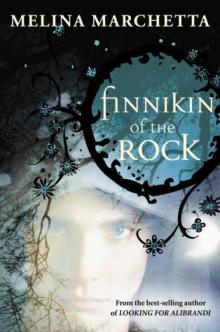 Finnikin of the Rock lc-1
Finnikin of the Rock lc-1 The Lumatere Chronicles
The Lumatere Chronicles